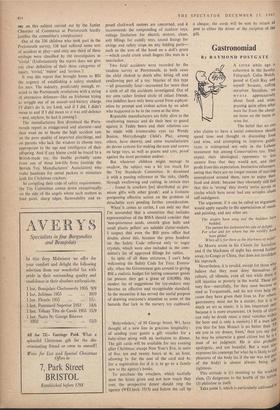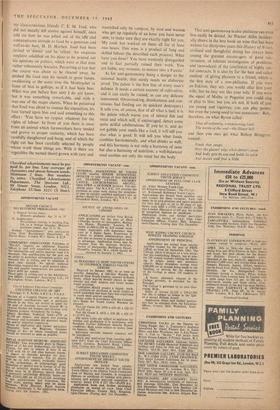Gastronomiad
By RAYMOND POSTG ATE A LITTLE while ago a columnist in the Sunday Telegraph, Colin Welch, jeered at Cyril Ray and myself because, calling ourselves Socialists, we wrote appreciatively about food and wine, praising quite often what were far from the cheap- est items on the menu or wine list.
The belief that no one who claims to have a social conscience should spend time and thought in discussing food and wine, and attempting to improve public taste, is widespread not only in the Labour movement but among Conservatives too. They expect their ideological, opponents to live austere lives that they would not, and they profit from this expectation. Instinctive reformers, seeing that there are no longer masses of starving unemployed around them, turn to enjoy their food and drink; because they obscurely still feel that this is 'wrong' they slowly move across to circles which• have never had any scruples about self-indulgence.
The argument, if it can be called an argument, would apply equally to the appreciation of musie and painting, and any other art.
The singers have sung and the builders hart builded, The painter has fashioned his tale of delight; For what and for whom has the world's book been gilded
When all is for these as the blacknes.s• of night?
So Morris wrote in his Chants for Socialists, and if the blackness of night has moved further away, to Congo or China, that does not invalidate his reproach. Nevertheless, it is invalid, except for those wito
.
believe that they must deny themselves 311 culture, all idleness, even all rest while there iS still injustice or poverty in the world. These are very few—mercifully, for they soon become as mad as Torquemada, and do not even help the cause they have given their lives to. For others, gastronomy must not be a master, but it is es much an art as music; it is less important only because it is more evanescent. (A bottle of claret can only be drunk once; a meal vanishes within the hour and is only a memory.) If a man tell: you that for him Mozart is no better than see you in my dream, Ireen,' then you say that he may be otherwise a good citizen but he is man of no judgment. He is also probably apologetic, and not boastful. But a man who expresses his contempt for what he is likely to can pleasures of the body (as if the ear was not Patt of the body) is almost always being self' righteous. This attitude is (1) insulting to the workia class, (2) dangerous to the health of the nation, (3) philistine in itself.
Take point 1, which is particularly addressed t°
my class-conscious friends. C. E. M. Thad, who did not usually tell stories against himself, once told me how he was jolted out of his idle and contemptuous attitude to food by a generous and well-to-do host H. D. Harben. load had been invited to dinner and- he talked. An exquisite omelette solidified on his plate as he poured out his opinions on politics, %s hich were at that time rather vehemently Socialist. Perceiving at last that the course was about to' be cleared away, he pushed the food into his mouth in great lumps, swallowing at the same time the Montrachet in front of him in gollops, as if it had been beer. What was put before him next I do not know, but it was something remarkable, and with it was one of the major clarets. When he perceived that Joad was about to resume his exposition., his host turned upon him and said something to this effect: 'You have no respect whatever for the rights of labour. In front of you there is meat • from an animal which farmworkers have tended and grown to proper maturity, which has been • carefully slaughtered and hung, and of which the right cut has been carefully selected by people whose work these things are With it there are vegetables (he named them) grown with care and nourished only by compost, by men and women who get up regularly at an hour you have never seen, to make sure they are exactly right for you. 'My cook has worked on them all for at least two hours. This wine is a product of long and skilled 'labour (he described each process). What have you done? You have wantonly disregarded and in fact partially ruined their work. You are liable, any moment, to mature into a Fascist.'
As for anti-gastronomy being a danger to the national health, that surely needs no elaborate proof. The palate is the first line of every man's defence. It needs a certain amount of cultivation, and it can easily be ruined, as can any delicate instrument. (Oversmoking, drunkenness and con- tinuous bad feeding are its quickest destroyers.) It tells you, of course, first Of all what is bad; it is the palate which warns you of tainted fish and meat and which will, if encouraged, detect some quite skilful adulterations. If you let it, and do not gobble your meals like a fool, it will tell you also what is good. It will tell you what foods combine harmoniouSly, and what drinks as well; and this harmony is not only a harmony of taste but also a harmony of nutrition; a well-balanced meal soothes not only the mind but the body. That anti-gastronomy is also philistine can 'even less easily be denied, As Warner Min incident- ally shows in the best book on wine that has been written for thirty-two years (his History of Wine), civilised and thoughtful dining has always been among the greatest encouragers of good con- versation, of .tolerant investigation of problem., and (nowadays) of the conclusion of highly. Use- ful contracts. It is also by far the best and safest method • of giving pleasure to a friend, which is the first duty of a non-philistine. If you were an Eskimo, they say, you would offer him your wife; but he may not like your wife. If you were the equal of Melba or Paganini you could sing or play to him; but you are not. If both of you are young and vigorous, you can play games; but even the young need to rest sometimes: Rely, therefore, on what Byron called : That all-softening, overpowering lore!!
The tocsin of the soul—the dinner hen.
and then you may get what Bishop Bloupram wanted:
Truth that peeps,
Over the glasses' edge when dinner's done And body gets its sop and holds its noise And leaves soul free a little.



































 Previous page
Previous page